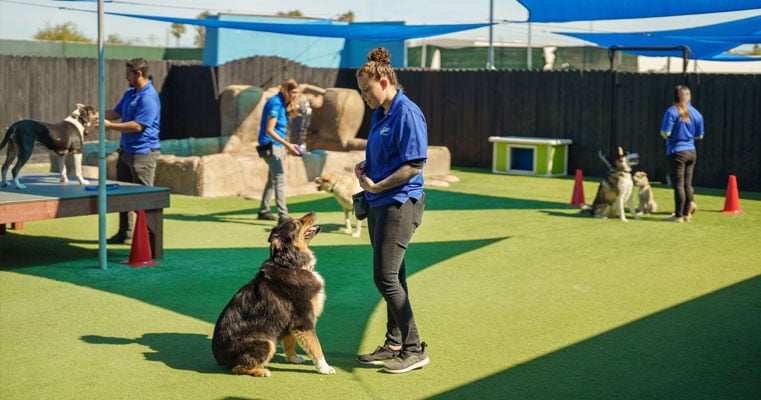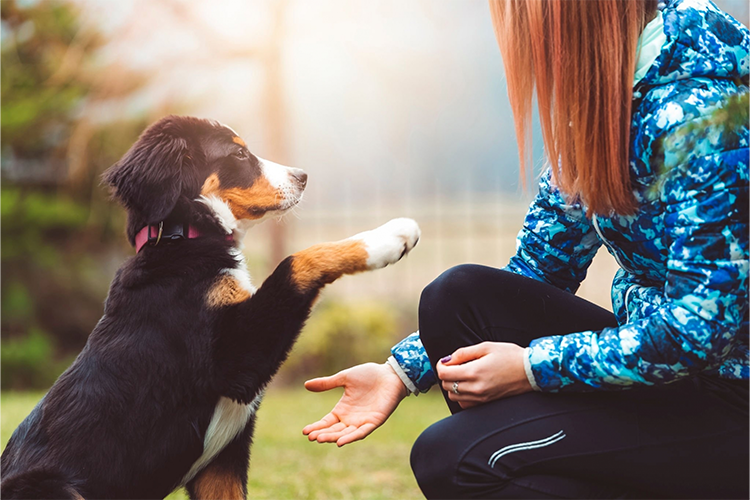The Ultimate Overview to Positive Reinforcement in Dog Training
Wiki Article
Unlock Your Dog's Possible With Reliable Educating Methods
Effective training methods can significantly improve your pet's capacity, changing not just their habits yet also the bond you share. Comprehending your dog's individual needs is critical, as it allows for tailored techniques that reverberate with their character.Recognizing Your Dog's Demands
To efficiently educate your pet, comprehending its demands is vital. Each dog is unique, possessing distinctive characteristic, temperaments, and histories that influence its habits and learning capacity. Recognizing these specific distinctions is vital for tailoring training strategies to make sure success.First, assess your pet dog's power, age, and breed level - dog training. Young puppies, for example, call for much shorter training sessions as a result of their minimal attention spans, while high-energy types might need extra strenuous activities to remain involved. Additionally, comprehending your pet's socialization needs is crucial; some pet dogs grow in team setups, while others may favor individually communications
Furthermore, know your canine's emotional state. Stress, fear, or anxiousness can restrain understanding, demanding an atmosphere where your pet really feels secure. Establishing a routine can also supply framework, which is advantageous for several canines.
Last but not least, pay interest to your pet's physical health, as discomfort or pain can substantially influence habits and learning capacities. By adequately comprehending your dog's demands, you lay the structure for efficient training, fostering a favorable partnership and boosting general well-being.
Positive Reinforcement Approaches
Favorable reinforcement methods are amongst one of the most effective training methods for pet dogs, promoting a positive understanding atmosphere. This technique includes rewarding preferred habits instead than punishing unwanted ones, which encourages pets to duplicate those behaviors. Rewards can take different kinds, such as treats, praise, playthings, or perhaps play, enabling personalization based on what inspires each private canine.
Furthermore, favorable support can enhance the bond between the pet and owner, as it advertises trust and motivates open communication. Owners can progressively phase out deals with as the behavior comes to be ingrained, transitioning to spoken praise or love as the primary rewards.
Uniformity in Training
A consistent training strategy is essential for efficient pet dog training, as it develops clear assumptions and aids canines understand what behaviors are encouraged. Consistency includes utilizing the same commands, cues, and compensates throughout various training sessions, which promotes a solid understanding and strengthens learning. When commands are given inconsistently, pets may end up being confused, bring about aggravation for both the proprietor and the pet dog.It is necessary to ensure that all member of the family or people engaging with the canine use the same terms and training methods. This harmony stops mixed signals that can impede a pet dog's capability to find out. In addition, strengthening Full Article desired habits right away and consistently with positive incentives, such as treats or appreciation, solidifies the connection between the activity and the outcome.
Training sessions ought to also be regular and structured, enabling gradual progression in complexity. This rep not just strengthens the pet's memory yet likewise constructs their confidence. Consistency in training produces a reputable structure that dogs can prosper within, inevitably leading to a well-adjusted and well-behaved pet dog. By committing to a regular method, owners can unlock their canine's full capacity and enhance the bond in between them.
Socializing Methods
While many canine proprietors concentrate mainly on obedience training, socializing methods are just as crucial for a canine's total development. Socialization entails subjecting canines to a range of settings, people, and other animals in a controlled fashion, allowing them to end up being comfy and confident in diverse scenarios.To begin socializing, start early ideally, as puppies are most flexible between 3 to 14 weeks of age. Present your young puppy to different stimulations, such as different sounds, textures, and sights. Gradually boost the complexity of these communications by going to parks, pet dog shops, or joining puppy classes, where they can satisfy various other pets and people.
Positive reinforcement is key during socialization. Reward your pet with deals with and praise when they display positive and tranquil actions in brand-new situations. This aids them associate unique experiences with favorable end results, lowering the probability of fear or aggressiveness in the future.
Furthermore, consistency is vital; on a regular basis exposing your dog to brand-new experiences throughout their life can assist keep their social abilities - dog training. By employing efficient socialization methods, you will home certainly promote a well-adjusted and sociable pet, qualified of browsing the world effortlessly

Advanced Training Strategies
Just how can pet dog proprietors raise their training method beyond fundamental commands? Advanced training techniques involve strategies that stimulate a pet's cognitive capabilities while promoting a much deeper bond in between the proprietor and pet dog. One efficient method is remote control training, which employs a distinctive audio to signal wanted actions, enhancing positive activities with immediate incentives. This method improves interaction and encourages the pet dog to engage actively in the understanding procedure.One more technique is making use of distractions throughout training sessions. By gradually introducing numerous stimuli-- such as other pets, people, or sound-- owners can show their pets to preserve emphasis and self-control in real-world circumstances. In addition, incorporating sophisticated obedience exercises, like executing or fetching objects dexterity tasks, can even more challenge a canine emotionally and literally.
Additionally, executing scent job motivates pets to use their natural reactions, involving their sense of odor while advertising analytical skills. Socialization within regulated environments can help canines discover to browse interactions with different breeds and environments, promoting self-confidence and versatility. By using these advanced training methods, pet proprietors can unlock their pet dogs' possibility, resulting in a well-rounded and loyal friend.
Conclusion
Efficient training methods are important for opening a canine's potential and cultivating a harmonious relationship in between dog and owner. Advanced techniques, such as remote control training and aroma job, further boost a pet's mental interaction and behavioral technique.Additionally, comprehending your canine's socialization requires is crucial; some pets prosper in group setups, while others may prefer individually interactions.

A constant training technique is crucial for effective canine training, as it establishes clear expectations and helps pet dogs understand what behaviors are find here motivated. By utilizing these advanced training strategies, canine owners can open their canines' possibility, leading to a obedient and all-round friend.
Efficient training techniques are important for opening a dog's prospective and promoting a harmonious relationship between dog and proprietor.
Report this wiki page